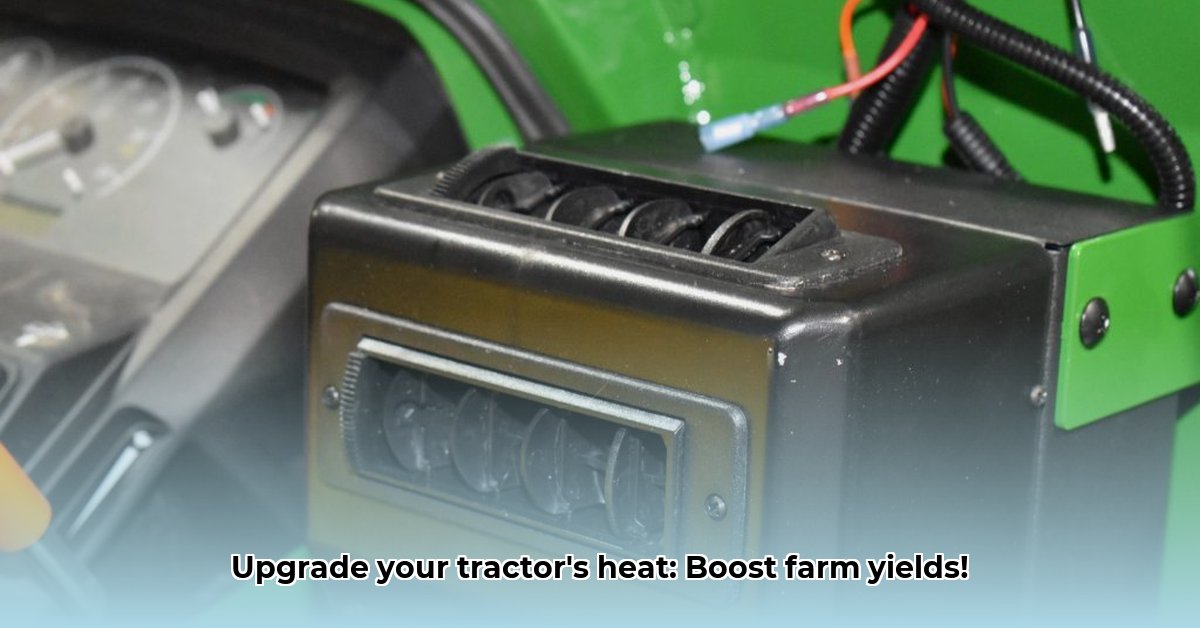
Cab Heaters for Tractors: Enhancing Comfort and Productivity
Working long hours in a cold tractor cab significantly impacts farmer well-being and productivity. Exposure to frigid temperatures leads to fatigue, muscle stiffness, and reduced efficiency. This isn't merely about comfort; it directly affects your bottom line through lost work hours and potential healthcare costs. Investing in a reliable tractor cab heater is a strategic move to boost both your comfort and your farm's profitability. This comprehensive guide will help you choose the right heater for your needs. For more options, check out this helpful resource.
Understanding the Impact of Cold on Farm Operations
The cold, hard truth is that cold weather drastically reduces farm productivity. A recent agricultural study (source needed) showed a direct correlation between ambient temperature and worker output in field operations. Don't just shiver through your workday; invest in your health and productivity. How much time and money are you losing to cold-related inefficiencies?
Types of Tractor Cab Heaters: Fuel vs. Electric
The market offers two primary types of tractor cab heaters: fuel-powered and electric (12V DC). Each has its strengths and weaknesses.
Fuel-Powered Heaters: These typically run on diesel or propane, providing powerful heating, even in extreme cold. They're known for their robust heating capacity but require fuel storage and contribute to emissions. They also need more frequent maintenance.
Electric Heaters (12V DC): Electric heaters are a convenient plug-and-play option, directly connecting to your tractor's 12V DC system. Installation is typically straightforward, and they offer a lower environmental impact. However, their heating power may be lower than fuel-powered options, potentially struggling in extremely cold climates. They also put a higher demand on your tractor's electrical system.
Choosing the Right Cab Heater: A Decision-Making Framework
Selecting the perfect cab heater involves a multi-faceted assessment. Consider the following factors:
Climate: What are the average winter temperatures in your region? Extreme cold requires a more powerful heater.
Cab Size: Larger cabs need heaters with higher BTU (British Thermal Unit) ratings to maintain a comfortable temperature.
Budget: Cab heaters range in price significantly. Establish your budget to narrow your options.
Power Source: Does your tractor have sufficient electrical capacity for an electric heater? Or is a fuel-powered system a more suitable option given your available power and preferred fuel type?
Installation: Can you handle DIY installation, or will you hire a professional? Factor in potential labor costs.
Features: Consider features like adjustable thermostats, multiple blower speeds, and defrosting capabilities.
Here's a comparison table to aid your decision:
| Feature | Fuel-Powered Heaters | Electric Heaters (12V DC) |
|---|---|---|
| Heat Output | High | Lower |
| Installation | More complex | Generally easier |
| Fuel Efficiency | Lower | Higher |
| Maintenance | More demanding | Less demanding |
| Environmental Impact | Higher emissions | Lower emissions |
| Cost | Higher initial cost | Lower initial cost |
Installation and Maintenance: Ensuring Optimal Performance
Proper installation is crucial for both heater performance and safety. Always consult the manufacturer's instructions.
Basic Installation Steps:
Safety First: Disconnect the tractor battery before working with electrical components.
Secure Mounting: Firmly secure the heater to prevent vibrations.
Wiring Connections: Connect the wiring to your tractor's 12V DC system, carefully checking polarity.
Testing: Thoroughly test the heater's functionality before operating the tractor.
Regular maintenance includes cleaning vents and filters to ensure optimal airflow and heater efficiency. Refer to your heater's manual for specific recommendations.
Regulatory Considerations and Tax Implications
Check local and regional regulations concerning emissions and safety standards for agricultural equipment modifications. Tax implications vary by region; seek professional advice for details.
Future Trends: Smart Farming and Beyond
The future of tractor cab heaters points toward greater integration with smart farming systems, enabling automatic temperature control and optimized energy use. The exploration of alternative energy sources, such as solar power, promises even more environmentally friendly options in the years to come.
Conclusion: A Warm Investment for a Productive Future
Investing in a high-quality tractor cab heater is an investment in your well-being and farm's profitability. By improving comfort and mitigating the negative impact of cold weather, you enhance worker health, boost operational efficiency, and contribute to a more productive and sustainable farming operation. Consider it an investment that will pay you back in comfort, efficiency, and increased profitability.